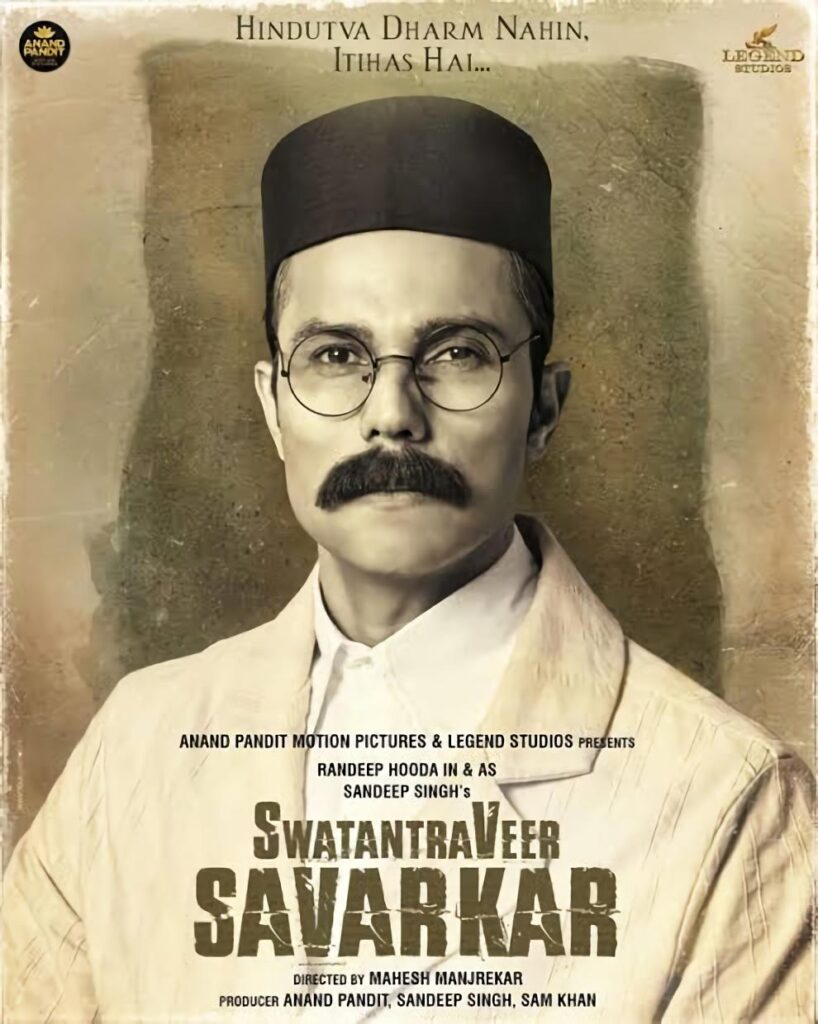Swatantra Veer Savarkar
Introduction
India is known for its Unity In Diversity across the globe. Read that again! It has been a rather quiet weekend in terms of its new releases wherein I am at the final review of the weekend already. With that, I finished watching the new Hindi film Swatantra Veer Savarkar, a film that is based on the life of the revolutionary Vinayak Savarkar, a controversial figure in Indian History. And I say controversial because there are too many things said about the personality, both for and against him, mainly related to his ideologies and his thoughts on Mahatma Gandhi. I just want to keep things simple and say that I have the highest amount of respect for anyone who has participated in the struggle for India’s Independence, no matter how small or big an individual is. And in that regard, Mr Savarkar has my respect. However, I was keen on knowing more about his life through the film that is the directorial debut of Randeep Hooda after he took reigns from Mahesh Manjrekar following some creative differences. And I did suspect that these ‘creative differences’ may be attributed to some sort of controversy involving the portrayal of Veer Savarkar(and I can ofcourse be wrong). So then, does Swatantrya Veer Savarkar manage to impress, let’s find out.
Story & Screenplay
Swatantra Veer Savarkar follows the story of Vinayak Savarkar who played an important part in India’s Independence from the British. The story always gets tricky in the biopic space because the moment you wish to pack in a lot of information from the life of an individual, the drama runs the risk of getting fragmented. And that is exactly what happens here apart from certain sequences that have perilously and blatantly twisted some Historic facts just to cater to a certain narrative. I would have not had a problem had to just showcased the drama through a certain lens but it seemed that the makers were hell bent in taking sides right from the beginning that ultimately lead to the downfall of the drama. Another huge drawback is the length of the film. Standing at almost 3 hours, the drama does seem to be never ending thereby making it a tedious watch.
The drama is essentially divided in the three act structure with the first act dedicated to the rise of an ideology against the British empire, the second is dedicated to the atrocities of the protagonist at the behest of the British empire, and the third act that has a strong political fervour in the narrative but also the most controversial with respect to the ‘History’ that it is trying to portray. Here I must add that the impact of the film would have been far more if the narrative structure was converted to that of a webseries. That would have atleast taken care of the fragmented beats in the narrative that quickly shifted focus from one incident to another with the ideology of the protagonist running as an undercurrent.
The proceedings are decent but I was way too distracted by the fragmented narrative structure that didn’t fully allow me to invest in the journey of the protagonist. And honestly, this was quite tricky given the narrative that it wished to address while trying to pack in events from the life of an individual, up until his arrest on charges of conspiracy behind the murder of Mahatma Gandhi. For me, the part that did actually work was the second act which was emotionally draining given the atrocities faced by the protagonist. The sequence of events was extremely tough to digest and watch as I also saw the brilliance of an actor willing to go to any length for a full body transformation in this span of time. But it is in its third act that the drama goes into an absolute tangent with the kind of politics it wished to represent.
One thing that I instantly did not like is the way the character of Mahatma Gandhi was showcased in the film. This is not particularly due to any sort of ideologies that I may or may not share with respect to the film. But this had more to do with the craft of writing of purposely intending to lower the stature of an individual while continuing to highlight the other side of the argument. This was particularly true in the final act that went on a rampage in driving home a point which is not exactly true even with the sequence of events showcased(or even from the interpretation of his ideology which is opppsite to what India is known for globally). For instance, the protagonist crossing worlds with Bhagat Singh is either integrated in the narrative to create a sensation or completely omitted from our History text books(you decide). The source material too turns grey with a few factual errors being conveniently introduced to tweak the History, even as the base set of events remain the same. What this did was make the narrative style, which was already fragmented, look even more caricaturish while intending to drive home a point at any cost(and I am sure there will be takers for it too). It needed a more nuanced approach to drive home the point which just wasn’t the case here. Overall, the screenplay has its moments but fails to make a lasting impact due to the fragmented narrative structure and factual errors along the way, and reducing the narrative to a tedious history lecture!
Dialogues, Music & Direction
The dialogues are fiery and atleast true to the era in which it is set in. The music is plain average and the rap song at the end woefully felt out of place given the ‘Historical’ drama at hand. The BGM is decent and does enough to hold your attention. The cinematography coupled with the production design does manage to impress by transporting you in the bygone era. The editing left a lot to be desired. There are many moments of a screenplay lag in the runtime of nearly 3 hours(the drama really did get repetitive after a point) and all of the lags needed to be ironed out for a crisper narrative. Also, the fact that the drama was terribly fragmented meant that the editing was way off! Director Randeep Hooda makes a decent start to his journey although it may well have been a task of handling multiple departments, something that shows in his directorial skills. I feel his ability to draw the line and having the clarity of how much is enough, would define his future journey. The direction wasn’t the best but wasn’t too bad as well.
Performances
The performances are pretty good here although the bulk of the heavy lifting is done by Randeep Hooda. Mrinal Dutt, Tirtha Murbadkar and Anjali Hooda have their moments to shine. Ankita Lokhande is strictly okay in a rather subdued role. Rajesh Khera as MK Gandhi leaves a lot to be desired but that had more to do with the writing of his character more than his performance. Amit Sial is nicely understated and fills his character with the right kind of emotions. But it is Randeep Hooda the actor who rises to the occasion with a towering performance as Veer Savarkar. His body transformation is unbelievable and it is clear that he has added a lot of blood and sweat to his character here. He has always been a fine performer and here he breathes life into his character(although marginally going overboard in the penultimate moments of the film. This was another performance by Randeep to cherish and savour and how I wish the writing of the film was better here.
Conclusion
Swantantra Veer Savarkar is tedious history lesson with factual errors that overpowers and annuls the good performances of the film. Available in a theatre near you.




